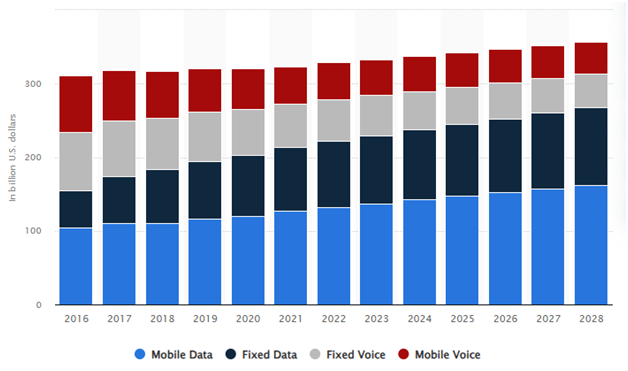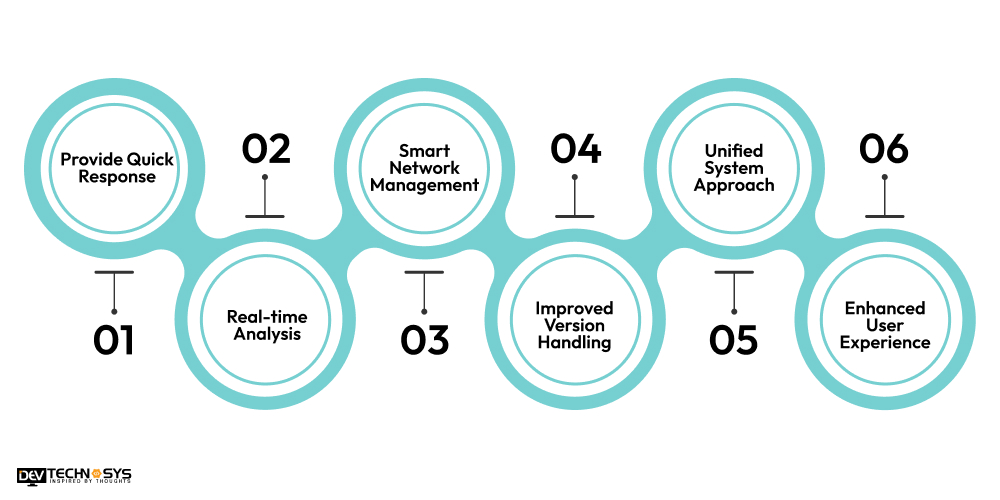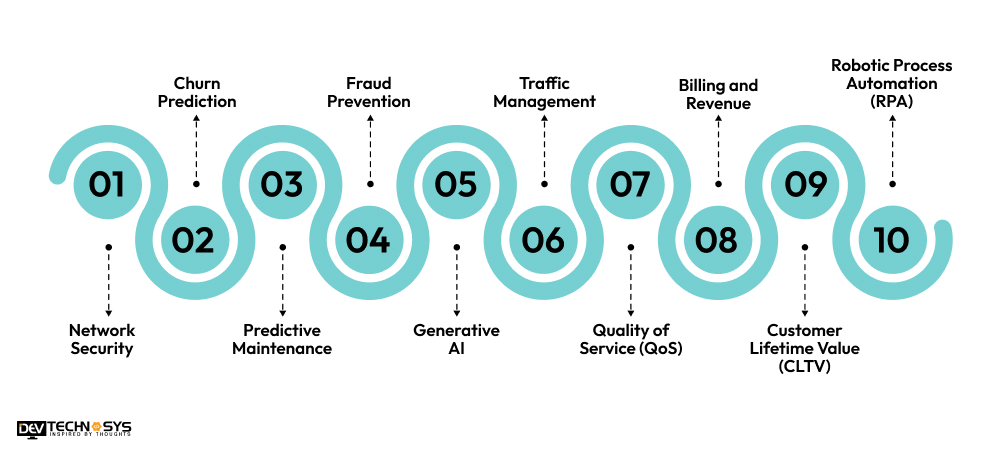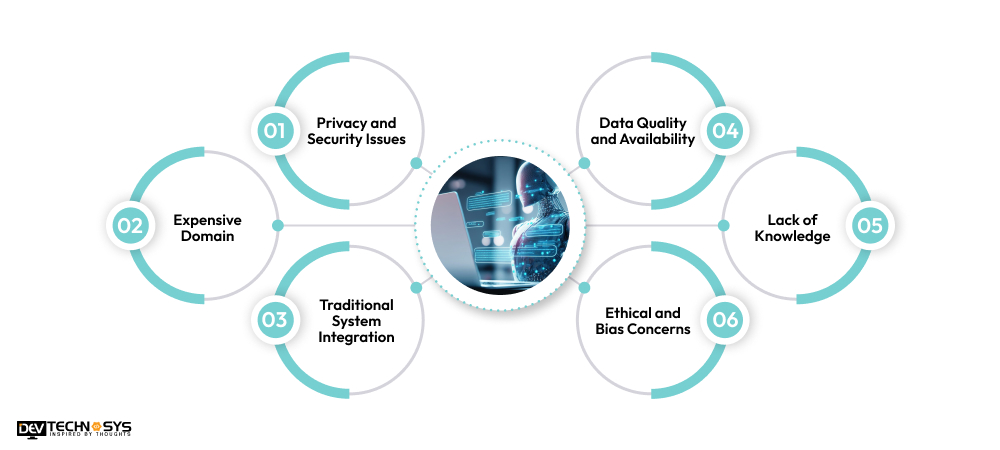The telecommunication industry is one of the finest sectors, producing huge revenue and creating many opportunities for business investors. Incorporating different technologies like Blockchain, Artificial Intelligence, Cloud, and Cyber Infrastructure has made this industry a top seeding among other domains. It is quite important to know their contribution to business growth.
AI has an impactful role in shaping the telecom sector into a new life for mobile and network communications. It is quite a difficult task to implement AI in telecommunication because of its high complexity and less available knowledge. But, we will make this easy for you so that there is no fear of AI remains in your mind.
We will discuss the basic terms, roles, benefits, use cases, and challenges of deploying Artificial Intelligence in the telecommunication industry. So, let us move forward to understand more.
Basic Terminologies
A business investor must understand a few basic terms before implementing AI in telecommunication. Majorly, two important things must be discussed regarding AI. In this section, we will learn about those factors in detail:
1. What is AI?
Technically, AI stands for Artificial Intelligence which means the logic that is designed by humans to reduce the effort and increase the work efficiency. Additionally, this technology can be used for mobile app development that can make them automotive and responsive on their own. But, to use AI algorithms you need a proficient hand that can implement this easily and quickly.
2. How Does it Work in the Telecommunication Industry?
AI primarily uses machine learning in telecom wireless communication setups. So, it works in the following manner:
- First, it collects data for processing.
- Then it optimizes the network to manage traffic.
- Lastly, it automates routine tasks for advanced analysis.
So, it is beneficial to contact a software development company to learn more about the workflow of AI in the telecom industry.
Market Stats Of AI in the Telecom Industry
- The telecommunications firm Verizon is the leading provider of mobile services in the United States of America.
- It has a market share of about over 37 percent of wireless subscriptions as of the second quarter of 2024.
- Till 2028, the revenue is forecast to exhibit fluctuations among the four below segments.

- Concerning the four selected segments, the segment Mobile Data has the largest revenue with $162.54 Billion.
- The global revenue in the communication services market was forecast to continuously increase between 2023 and 2028 by in total of 200 Billion.
- According to this forecast, in 2028, the indicator will have decreased for the fourth consecutive year to 1.9 percent.
What is the Role of AI in the Telecom Industry?
This blog is all about the role of AI in telecommunication services. Additionally, AI technology uses machine and deep learning modules to enhance the working of telecom channels and operators. It has multiple roles to identify and personalize the presence of the telecom industry.
To learn them in detail you can approach a full stack app development company that can prepare a document for your telecom business. Majorly, there are three main roles in using AI in the telecom sector. They are as follows:
- Automate the mobile networking services to decrease user efforts.
- Regularly check for fraudulent systems to maintain high progressive growth.
- Use a fair prediction model to satisfy the needs of customers through channel modulation.
What are the Benefits of Using AI in Telecommunication?
There are a lot of benefits of using AI in telecommunication that give it a new direction. Let us discuss a few major advantages with detailed insights in this section:

1. Provide Quick Response
This is a good idea to use AI with telecom services because it makes the industry quick and responsive for users. So, it is possible due to incorporating machine learning in telecommunications that use iterative algorithms that check for updates at regular intervals.
2. Real-time Analysis
The AI technology is compatible with every infrastructure providing real-time analysis of business models and communication spectrum. So, it is a brilliant thought to contact an affordable telecom app development company with updated and scholastic analytical services.
3. Smart Network Management
Businesses can observe a smart network management system in telecom services with the help of scholastic AI solutions. Additionally, this facility also reduces the cost to develop a mobile app that can provide network coverage with fast and improved quality.
4. Improved Version Handling
Investment of money in telecom application development with suitable AI services allows business investors to handle versions of AI with improvised solutions. Additionally, it also refers to the evolution of telecom services depending on the users and their preferences.
5. Unified System Approach
A unified system approach can be experienced by business investors through AI software development in telecommunication services. All the functionalities work consistently to make the process synchronous with communication channels. So, that it does not affect the capacity of the telecom spectrum.
6. Enhanced User Experience
Using AI with telecom services enhances and improves the user experience. Additionally, it is also suggested to invest in mobile app development services to use a predictive AI model. So, that users can get regular updates on communication channels and derived telecom operators.
Important Use Cases of AI in Telecommunication
The telecom industry is becoming portable and showing mobility due to the advancement of different technologies like Artificial Intelligence. As per scientific research, there are multiple use cases of AI in telecommunication. But, we are discussing the top 10 of them that are important and effective:

1. Network Security
Security of communication networks is the primary application of using AI services in the telecommunication industry. Additionally, there are hybrid app development service providers available from which you can avail effective networking solutions.
2. Churn Prediction
As a professional investor if you want to develop an AI application in telecommunication business then you must know the churning process of predictions. So, AI algorithms manage the dataset of model predictions and process them regularly to improve the quality of communication channels.
3. Predictive Maintenance
Predicate logic is used as a compulsory algorithm to maintain the authenticity of prediction supremacy for AI in the telecom industry. Additionally, predictive maintenance is considered a method to provide assistance for the decisions made by the AI model to operate the communication spectrum.
4. Fraud Prevention
AI can be used in detecting fraudulent activities that decrease the efficiency of communication channels. Additionally, it also provides preventive mobile app development solutions to restrict the effect of such practices in the telecom sector. So, you must ensure the regular working of the domain.
5. Generative AI
This is one of the most widely accepted and used applications of AI in the telecom sector. It is easier to make machine learning applications in telecommunications services using Generative AI solutions. Additionally, it provides a fundamental base to compute the signal to noise ratio to decrease disturbance.
6. Traffic Management
Another major application of implementing AI in telecom software development services is that it manages traffic on multiple communication channels. So, the throughput at the time of analysis is the maximum for hybrid platforms. Thus, AI is important for supporting and operating telecom services.
7. Quality of Service (QoS)
Services offered by telecom operators by using sophisticated AI models are standard and quality-approved. So, the cost to maintain a mobile app can be reduced by increasing the quality of AI infrastructure. But, it requires high investment and patience.
8. Billing and Revenue
The use of AI in generating bills for multiple payments and transactions is quite fascinating. Additionally, it also helps business investors in predicting the sales and distribution of revenue for various billing cycles. This is encountered as the most advantageous application of AI in telecommunications.
9. Customer Lifetime Value (CLTV)
In the telecommunication industry, it is important to maintain the lifecycle of communication channels. Additionally, users can also impart a good value on telecom services through customized portals. So, it is beneficial to invest in software development for telecom business investors.
10. Robotic Process Automation (RPA)
Using automotive bots that can handle high power is an indicative use case of AI with telecom selective channels. But, it comes with high cost and less durability. So, business investors can invest in software development services to make the process operational and capable of harnessing telecom services.
6 Major Challenges of Implementing AI in Telecommunications
Facing a challenge is more vulnerable than losing a benefit in the mobile app development process. Here are a few crucial challenges of deploying AI in telecommunication discussed to caution business investors:

1. Privacy and Security Issues
Implementing AI in telecommunications is quite a difficult task because it comes with a lot of data security and privacy concerns. Additionally, it provides an open channel to security breaches and gives a handful access of to users’ information to the attackers. So, this makes it vulnerable to malicious activities that make telecom systems inefficient.
2. Expensive Domain
The AI technology is very expensive due to its high complexity level and updated algorithms. As a business investor, it is profitable for you to consult the software development cost with a reputed mobile app development company. So, you can easily avoid the increment in the price value of AI services used to modify telecommunication operators.
3. Traditional System Integration
It is a hectic job for technical developers to integrate old and traditional telecom systems with new and updated AI services because of their high complexity. So, this motivates business investors to use AI in telecommunication market with upgraded communication channels. Additionally, it also requires a huge investment to make a new system from scratch.
4. Data Quality and Availability
Due to the high complexity and tricky functionalities of AI services, it is very difficult to measure the quality of data with the existing system. Additionally, the data is not easily available to the technical experts. So, it needs highly equipped telecom software development services that could match the unpredictable nature of AI and its fundamentals.
5. Lack of Knowledge
Artificial Intelligence is a vast and competitive technology that comprises various difficult algorithms that are not easy to use. So, finding a mobile app developer who can use AI in mobile app development in an easy manner is very tough. Additionally, you need a profound hiring team that can judge the efficiency of the development partner and their ability to handle pressure situations.
6. Ethical and Bias Concerns
Often AI algorithms could be biased on different decisions leading to unfair and manipulative practices. Additionally, this can result in discrimination for telecommunication software development services. So, it is necessary to ensure transparent, ethical, and unbiased AI algorithms while developing telecom operating channels for worldwide communication.
Get a Final Thought!!
In the continuation of this blog, it is now up to you to start investing in the AI domain to improve your telecom business. After fixing all the logic for using AI in telecommunication and methods to cope with challenges it gets comparatively easy for you to start the development process from now onwards. It is beneficial to contact a mobile app development company to discuss all functionalities.
To develop a telecom AI model for your business it is quite advisable to consult on profitable solutions with a hired development partner. Gather all the useful resources that can make your telecom business emerge as a leading venture in this industry. So, start following a precise method and keep all the aspects discussed in this blog ready in your mind.
FAQs
1. What is the Role of AI in Telecommunication?
- To provide automation for mobile services.
- Check for fraudulent servers.
- Enable predictive services to engage users.
2. How Does AI Work in the Telecom Sector?
- Check for network optimization and security.
- Provide customer services by detecting and preventing fraud.
- Optimize traffic flow to enhance user experience.
3. How Much Cost is Required To Implement AI in Telecommunication?
- The cost may vary due to different factors like complexity and location.
- It ranges between $8,000-$14,000 for a simple AI model.
- But, it may increase up to $25,000 or more with additional complexities.
4. What are the benefits of AI in the Telecom Industry?
- It improves customer support through network optimization and management.
- Removes the chances of breaches through predictive maintenance.
- AI supports high-end automation and a suitable user experience.
5. What are the Challenges of Using AI in the Telecom sector?
- AI is very expensive having privacy and security issues.
- High complexity and lack of available resources.
- It can be biased on decisions making it unethical.
6. What are the Applications Of AI in Telecommunication?
- It manages traffic and optimizes network capability.
- Provide chatbots for customer support.
- Has automated market designing and planning functions.
















